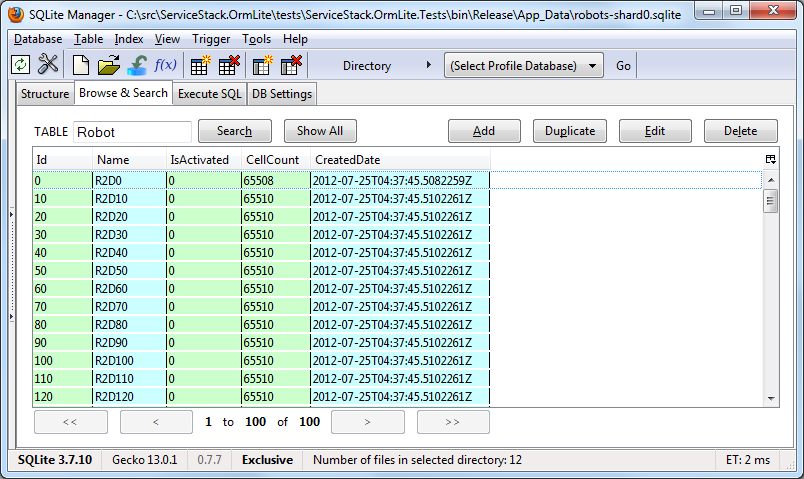The OrmLiteConnectionFactory class supports registering multiple named connections allows you to define all your
db connections when registering it in your IOC, that can be accessed later using its registered name.
Primary DB & Multi Shard DB Example
A popular way of scaling RDBMS's is to create a Master / Shard setup where datasets for queries that span entire system are kept in the master database, whilst context-specific related data can be kept together in an isolated shard. This feature makes it trivial to maintain multiple separate db shards with a master database in a different RDBMS.
Here's an (entire source code) sample of the code needed to define, and populate a Master/Shard setup. Sqlite can create DB shards on the fly so only the blank SqlServer master database needed to be created out-of-band:
Sharding 1000 Robots into 10 Sqlite DB shards
public class MasterRecord {
public Guid Id { get; set; }
public int RobotId { get; set; }
public string RobotName { get; set; }
public DateTime? LastActivated { get; set; }
}
public class Robot {
public int Id { get; set; }
public string Name { get; set; }
public bool IsActivated { get; set; }
public long CellCount { get; set; }
public DateTime CreatedDate { get; set; }
}
const int NoOfShards = 10;
const int NoOfRobots = 1000;
var dbFactory = new OrmLiteConnectionFactory(
"Data Source=host;Initial Catalog=RobotsMaster;Integrated Security=SSPI", //Connection String
SqlServerDialect.Provider);
dbFactory.Run(db => db.CreateTable<MasterRecord>(overwrite:false));
NoOfShards.Times(i => {
var namedShard = "robots-shard" + i;
dbFactory.RegisterConnection(namedShard,
$"~/App_Data/{shardId}.sqlite".MapAbsolutePath(), //Connection String
SqliteDialect.Provider);
dbFactory.OpenDbConnection(namedShard).Run(db => db.CreateTable<Robot>(overwrite:false));
});
var newRobots = NoOfRobots.Times(i => //Create 1000 Robots
new Robot { Id=i, Name="R2D"+i, CreatedDate=DateTime.UtcNow, CellCount=DateTime.Now.ToUnixTimeMs() % 100000 });
foreach (var newRobot in newRobots)
{
using (IDbConnection db = dbFactory.OpenDbConnection()) //Open Connection to Master DB
{
db.Insert(new MasterRecord { Id = Guid.NewGuid(), RobotId = newRobot.Id, RobotName = newRobot.Name });
using (IDbConnection robotShard = dbFactory.OpenDbConnection("robots-shard"+newRobot.Id % NoOfShards)) //Shard
{
robotShard.Insert(newRobot);
}
}
}
Using the SQLite Manager Firefox extension
we can peek at one of the created shards to see 100 Robots in each shard. This is the dump of robots-shard0.sqlite:

As expected each shard has every 10th robot inside.